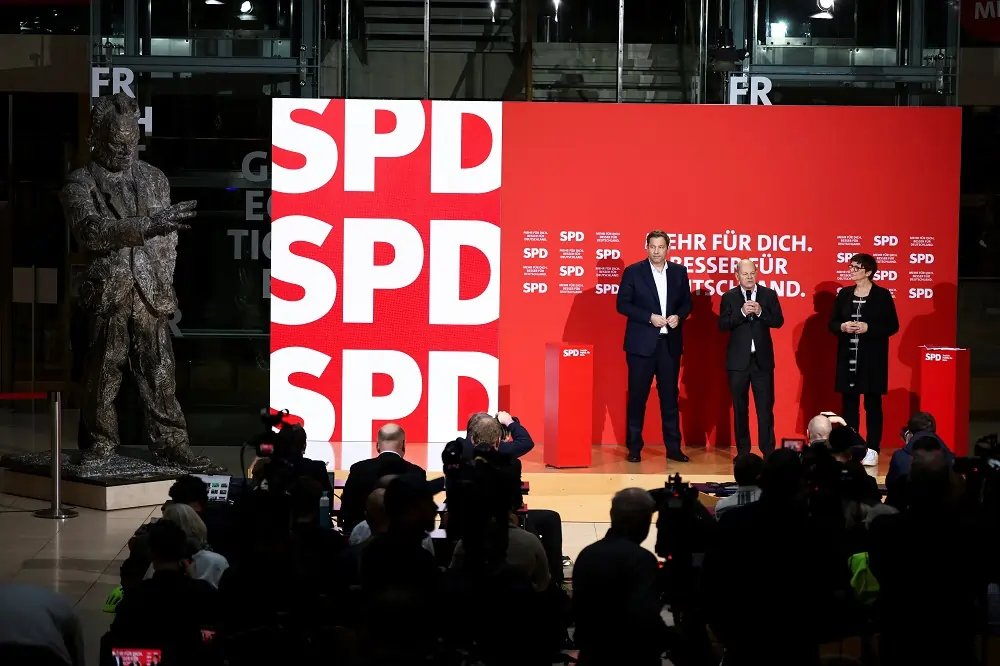Parties unveil plans to rescue Germany from economic doldrums
Published by Jessica Weisman-Pitts
Posted on December 17, 2024
4 min readLast updated: January 28, 2026

Published by Jessica Weisman-Pitts
Posted on December 17, 2024
4 min readLast updated: January 28, 2026

By Andreas Rinke and Matthias Williams
BERLIN (Reuters) -Germany’s main political parties presented their competing plans on Tuesday for lifting Europe’s largest economy out of the doldrums as campaigning kicked off for a snap election on Feb. 23.
The election, triggered after Social Democrat Chancellor Olaf Scholz’s three-party coalition collapsed last month amid arguments over debt and then lost a parliamentary vote of confidence on Monday, comes at a testing time for Germany.
Its economy is set to shrink for a second straight year, industrial giants like Volkswagen face an existential threat from foreign rivals and political attitudes are hardening towards migrants.
Data from the Ifo institute also delivered a sharp reminder of Germany’s woes on Tuesday, showing that business morale worsened more than expected in December.
Friedrich Merz, leader of the conservatives who are tipped to win the election, said at his party’s manifesto launch that they were ready to govern Germany again after three years in opposition.
“The chancellor asked for a vote of confidence yesterday and lost. He lost the trust of the majority of the population long ago. He has also lost the trust of investors who have been leaving Germany for several years now,” said Merz.
His Christian Democratic Union party (CDU) wants cuts to income and corporation taxes and lower electricity prices as a way to boost the economy.
His political opponents say Merz’s policies are uncosted, though the CDU believes it can finance them through faster economic growth and cuts in some welfare payments.
DEBT BRAKE REFORM?
Merz has so far said he plans to stick to a constitutionally-enshrined government spending cap known as the debt brake. The tool was introduced after the 2009 financial crisis but critics say it hobbles growth by restricting borrowing and investment.
Scholz’s Social Democrats (SPD) and their coalition ally the Greens want to reform the debt brake.
Economy Minister Robert Habeck from the Greens accused Merz of failing to grapple with the realities facing Germany.
“We have to get our infrastructure up to scratch,” Habeck said at the presentation of his party’s manifesto, estimating that an overhaul of Germany’s creaking infrastructure would cost hundreds of billions of euros over the next decade.
“That requires a reform of the debt brake.”
Scholz, the most unpopular German leader of modern times, is battling to regain the initiative, and his SPD has also proposed incentivising private investment and modernising infrastructure with an off-budget 100 billion euro fund.
However, some economists questioned whether any of the main parties offered major change.
“Small-scale measures won’t help – we have to think bigger. You can’t really see that in most of the election manifestos,” said Cyrus De La Rubia, Chief Economist at Hamburg Commercial Bank.
“Of course, it improves morale when income taxes are reduced… If these micro-interventions continue, resignation will finally take hold because of the lack of courage.”
Oliver Holtemoeller, Vice President at the Halle Institute for Economic Research, questioned whether there would be a majority in the new parliament to back reform of the debt brake.
“The election programmes are more wish lists than programmes for government action, as many things may not be implemented within the current legal framework of the debt brake.”
DIVISIONS ON UKRAINE
Apart from the economy, other issues set to dominate the election campaign include migration and the war in Ukraine.
Germany under Scholz has ramped up defence spending and become the second biggest military backer of Ukraine behind the United States.
However, Merz would like to go further by equipping Kyiv with Taurus missiles, a step Scholz fears could drag Germany into direct confrontation with Russia.
The Greens want defence spending raised beyond the NATO alliance target of 2% of national output.
By contrast, the far-right Alternative for Germany (AfD), currently in second place after the conservatives in opinion polls, wants an end to weapons deliveries to Ukraine and a resumption of good relations with Moscow.
(Reporting by Andreas Rinke, Matthias Williams, Holger Hansen, Rene Wagner, Kirsti Knolle, Alexander Ratz, Christian Kraemer; Writing by Matthias WilliamsEditing by Gareth Jones)
Economic growth refers to an increase in the production of goods and services in an economy over a period of time, typically measured as the percentage increase in real GDP.
Corporate tax is a tax imposed on the income or profit of corporations, which varies by jurisdiction and can significantly impact business investment decisions.
A financial crisis is a situation in which the value of financial institutions or assets drops rapidly, often leading to a loss of confidence in the economy and significant economic downturn.
Business investment refers to the purchase of goods and services by businesses to enhance their production capacity or efficiency, often seen as a key driver of economic growth.
Explore more articles in the Top Stories category











